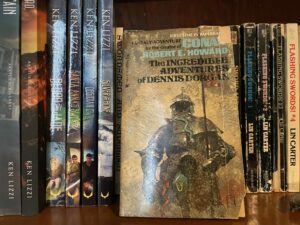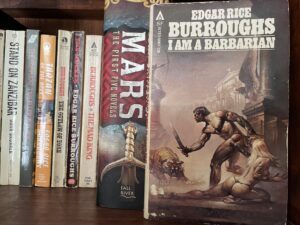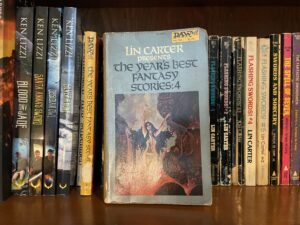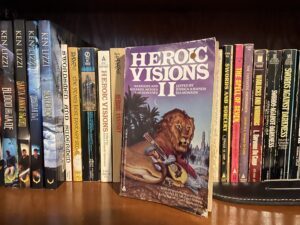Ken Lizzi's Blog, page 13
July 9, 2023
The State of the Writer.

It seems like a good time to take stock. We’ve reached the second half 2023. Summer, in all its blistering glory is firmly in place. The fifty weeks of serializing Savage Journal are behind now. (Regarding which, I hope some of you enjoyed it.) I’m feeling settled in; it has been a bit over a year since the move from Oregon to Texas. The essential work of inhabiting a new locale is done: drivers’ licenses acquired, vehicles licensed, water utility located, power company, internet, new school (we’ve actually done that twice now, having found a closer — and somewhat less expensive — school for the HA), etc. There were additional novel factors such as establishing a new business, becoming a member of another State’s bar, and installing a swimming pool. MBW and I have been busy.
I’ve also been writing. I sent a book manuscript off to a publisher the other day. Fingers crossed. I have stories waiting for responses, and a couple for which I’m expecting (with a certain degree of confidence) contracts. I’ve started writing another novel.��(Why? Why do I continue writing?) The Semi-Autos and Sorcery series seems complete at four volumes. Falchion’s Company is a tidy package at three volumes (the traditional fantasy trilogy, I suppose.) Three stand-alone novels preceded those. I think I’ll stick with the one-and-done novel for a while. Developing something new scratches my creative itch more completely than continuing a story, though series fiction does offer the pleasure of more fully exploring an invented world.
I suppose I’ll keep at it. I achieve a degree of satisfaction upon finishing a writing project, a feeling akin to that of brewing a keg of beer: I made that. I made that and it’s good. Hmm, now I’m thirsty.
July 2, 2023
Robert E. Howard’s Dennis Dorgan. Plus Savage Journal Entry 50.

Dennis Dorgan, the character whose exploits are collected in The Incredible Adventures of Dennis Dorgan, is definitely not Popeye the Sailor Man, despite his creation shortly after the release of E.C. Segar’s classic character in 1929. Dennis makes this perfectly clear by his stated dislike of canned spinach. Though both men are sailors, speak in distinctive jargon, and frequently engage in fisticuffs, Dorgan is in fact derived from another sailor: Sailor Steve Costigan, Howard’s other pugilistic seaman. As noted in the introduction to the anthology, Howard rewrote some of his Costigan stories, changing the name of the character, the name of the character’s dog, and the name of the ship upon which he served. Setting the stories primarily in the East allowed Howard to pitch these to the Oriental tales markets, rather than just the boxing magazines.
The first thing to keep in mind when reading a Dennis Dorgan story is that these are primarily comedies. If you’ve read the Breckinridge Elkins stories, the pacing, plots, and even to some extent the carefully mangled English grammar will be familiar. In fact, there might even be an unofficial crossover, as a Bill Elkins appears prominently in the story The Destiny Gorilla. Perhaps he is a son or grandson of Breckinridge himself. Hard to say, though he does fit the Elkins family profile.
The plots are driven largely by Dorgan’s limited intelligence, gullibility, and willingness to oblige — especially where ladies are concerned. The fights, though lavish in their description of mayhem, are so over the top that the effect is comedic rather than pulse-pounding. Cartoonish, in fact. These are fun, lightweight stories, best enjoyed with an adult beverage.
You may enjoy my books with or without an alcoholic accompaniment. Give the Semi-Autos and Sorcery series a try. I think you’ll enjoy the books.
And now I might want to crack open an adult beverage to say farewell to Magnus Stoneslayer. Here is the final entry in his journal. Fare thee well, Magnus.
SAVAGE JOURNAL
ENTRY 50.
I’ve always been accustomed to dealing with victory, dear diary, but my enjoyment of the fruits of success has always proven transitory. It seems I must now grow used to triumph as a permanent state.
That’s not the only sort of permanence I must adjust to. Sitting at my side in the Zantian Imperial throne room is Yaslina, a quiet, happy smile adorning her face. Thronging the audience chamber are the officers who so recently acclaimed me Imperator. Husband. Monarch. Neither loyal wife nor loyal subjects appear inclined to alter my status any time soon.Stability, permanence, Odd words to use describing a wandering barbarian warrior. It may just be that while ‘barbarian’ and ‘warrior’ remain appropriate, ‘wandering’ no longer applies.
Yaslina leaned across the arms of our twin thrones to whisper in my ear, confirming my suspicion that I am no longer itinerant, dear diary; It appears I’m to be a father.
Magnus Stoneslayer
June 25, 2023
Weird Tales Four, Plus Savage Journal Entry 49.

I picked up this book for the cover. I mean look at it. There’s a story in that artwork. Unfortunately that story isn’t in this book. Not even tangentially. There are other disappointments. It is haphazardly edited and printed. The introduction (which opens the book for a page at the front, then is continued at the back for the final few pages) promises a Ramsey Campbell story that fails to appear. But perhaps the contents could make up for the shortcomings. Did they? Read on.
The Next Glade. Robert Aickman. This is a pointless, meandering tale of a dithering, faithless British housewife. It’s all setup, no payoff. It is as if Neil Gaiman started writing a story, forgot what it was supposed to be about, and decided to just type “The End.” It is New Yorker Magazine fantasy fiction — everyone is apparently between the lines, sine nothing revelatory made it into the lines themselves. Or, perhaps, I”m merely an uncommonly dim, clueless philistine.
Crocuses. Charles Sheffield. A step in the right direction. We get a complete narrative, albeit one trafficking in some tiresome tropes. It is a weird tale of the horror variety (get used to that.) What sinks it in my estimation is the deliberately ambiguous ending. I prefer a bit more clarity. Hard to find the horror in a piece if I don’t know what I’m supposed to be horrified of.
The Belfry. James Anderson. Comparatively straight-forward action/horror with a supernatural twist. Competently written, though the setting could have been more clearly detailed.
There Are No Ghosts in Catholic Spain. Ray Bradbury. A bit of charming poetry. Fluff, perhaps, but Bradbury fluff.
Homecoming. Frank Belknap Long. 1980s New England gothic. It is a tale of psychic vampires, mystic backwoodsmen, and temporal horror. Much more is suggested and implied than explained, but sufficient hints are laid out to create a less irksome degree of ambiguity than some other entries in this anthology. I generally liked it. It has a whisper of Poe and of Chambers that resonated.
Compliments of the Season. John Brizzolara. Solid 1980s supernatural horror meets American Psycho. Seems almost too much a mainstream piece of horror fiction to belong in Weird Tales. But it is entertaining.
The City of Dread. Lloyd Arthur Eshbach. Commences with a classic adventure tale set piece of the sort recreated in Indiana Jones. There is a lost world vibe, enhanced by plot-driving supernatural elements. Then there is a definite heroic fantasy feeling. I can’t help but be reminded of my own Blood and Jade, as if I’m reading a distant, shadowy precursor. This is old school weird fiction, A. Merritt territory. Good stuff, building in intensity — though unfortunately that momentum is marred by having two pages of the climax reversed (pages 194 and 195) which rather spoils the impression. Still, my favorite so far. Objectively, I probably wouldn’t have liked it so much had it been printed along with a stronger line up. But in this context it worked for me.
The Doom Chant of Than-Kul. Robert E. Howard. Poetry in a Cthulhu Mythos vein. Or so I gather. Perhaps some Howard scholars could shed some light on this.
Save the Children. Steve Rasnic Tim. An odd piece of psychological horror. Again, too ambiguous for my tastes.
The Sea-Gods. Clark Ashton Smith. Moody poetry.
Ooze. Anthony M. Rud. Classic hackneyed monster fun. A curiosity, mostly, but worth the read.
Late Night Final. Stuart H. Stock. Unquestionably a “weird” tale. The story is about a man who notices strange, malevolent entities in New York City. It ends rather predictably and suffers to an extent the ambiguity that weakens all to many of the other entries.
The Vengeance of Yig. Lin Carter. An engaging entry in the Cthulhu Mythos cycle. At least for readers who are not Lovecraft purists. Carter, as usual, shows his gift for stylistic mimicry.
Overall then, Weird Tales #4 is rather a disappointment. I got my three dollars worth, but just barely.
You’d get good value for money with any of my own books. Give Under Strange Suns a try. I think you’ll like it.
And now for the penultimate entry in Magnus Stoneslayer’s diary. Next week will see the last. Sigh, they grow up so fast.
SAVAGE JOURNAL
ENTRY 49.
A savage is used to a certain perspective in battle, dear diary, and that is right in the thick of it, vision clouded by a mist of blood, viscera, sweat, and rage. The responsibility of generalship enforces a wholly different perspective, distanced, detached. A shift in perspective: just one of the many changes I’ve undergone since linking my destiny to Yaslina’s.
We faced the decisive battle today. Months of inconclusive skirmishes and evolving alliances have led to two armies facing each other across a shallow valley.
I’ve learned much from Yaslina’s uncle Ancus these grueling weeks, adding the benefit of the old campaigner’s experience to the innate martial talents of the barbarian. So it was with bone deep confidence that I arrayed my forces ��� left, center, and right ��� set screening cavalry on the flanks, calculated lanes of advance and withdrawal, and established rally points. My confidence remained unshaken when the two bodies finally clashed in a thunderous collision of flesh and steel. I sat my horse, stoic as a mountain, waiting and watching.
To all practical extent the armies were an even match. In such a case the deciding force can be the commander. What choices will he make? When will he commit the reserves? Is he impatient? Will he move too soon? As I believe I’ve mentioned before, dear diary, one thing the savage possesses in abundance is patience.
Our left was hard pressed, giving ground ��� grudgingly, but giving way nonetheless. My opposite number saw this as his opportunity and ordered forward his reserves to bolster the attack of his right. My sub-commanders urged me to reinforce our left with our reserve. I told them to hold their water; our men were not yet in danger of breaking. They were put hard to it, falling as they backed away, but taking a toll on the enemy for every step lost. So the Zantian general withdrew the rear ranks of his left, marching them along the rear of the battle to join his right for a decisive push with overwhelming numbers.
I ordered, ���Send the reserves. Against his left.���
Our left would hold, their fighting retreat would bring them up a low rise, a knoll studded with man sized boulders, a natural fortress, offsetting the enemies’ numerical advantage. Our reserves would roll up the depleted contingent of the enemy left. This battle was effectively over. This war was over.
And then I saw him, to the rear of the reinforced Zantian right. Even at this distance the gleaming armor of that self-important popinjay Gaius was unmistakable. All decisions I needed to make as general had been made. I needed no longer remain aloof. So I spurred my warhorse into a downhill, momentum building charge, not sparing a glance to see if my staff and bodyguard followed. I found a seam and plowed through the enemy, bodies flung left and right from glancing blows delivered by the armored chest of my heavy, snorting charger. Gaius saw me coming and tried to wheel away. Too late. My charger caught his lighter racing steed amidships, bowling horse and rider over in a tangle of human and equine limbs. Gaius pulled free of the wreckage just in time to catch my descending sword blade between his eyes, his decorative helmet parting like gold foil, his skull with the satisfying pop of a roasted nut.
As I prepare for sleep, with the cries of ���Imperator��� still ringing in my ears, I reflect that even with the weight of responsibility, there comes a time, dear diary, when all duties required of a man have been discharged, and he can release his inner savage. I take no small comfort from that.
Magnus Stoneslayer
June 18, 2023
Edgar Rice Burroughs’ I Am A Barbarian. Plus Savage Journal Entry 48.

Among the haul I picked up at the North Texas RPG Con was Edgar Rice Burroughs’ I Am a Barbarian. I’m not ashamed to admit that I was drawn by the cover. It appears to be early Boris Vallejo, prior to his style taking on a glossy sheen. Surprisingly, the cover depicts (more or less) a scene that actually occurs in the narrative, near the end. I found that a happy bonus.
The book is a relatively conventional historical novel. This may come as a surprise to those who know ERB only from Tarzan or John Carter. But ERB’s output spanned multiple genres, viz. The Mucker. Barbarian is a first person narrative by a Briton enslaved by the Romans who becomes the lifelong body slave of Caligula. The early sections are probably the most entertaining, and those in which ERB allows himself the most freedom. Once he gets into Caligula’s adulthood, the story sticks closely to the then-accepted outline of Julio-Claudian intrigue, incest, and murder. (For a less orthodox take on the subject, read Dynasty: The Rise and Fall of the House of Caesar.) The latter half of Barbarian reads like a refresher course in Roman history. But happily ERB knows how to keep things moving, and he spices up the tale with a love story and that scene shown on the cover. Unhappily, he apparently got bored, since the book simply ends. Perhaps he intended to write a sequel. I was hoping for some idea of the narrator’s life after the death of Caligula. I suppose I must simply get used to disappointment. Nonetheless, I recommend this one. It moves fast, maintains the readers interest, and does an excellent job of bringing the color, pageantry, and misery of early Imperial Rome to life.
I, too, try to bring visions to life in my writing. Have you read Thick As Thieves? Give it a try. You can find it wherever you buy books online. Amazon is one option. Barnes & Noble another.
And now another Savage Journal entry. The end is drawing nigh.
SAVAGE JOURNAL
ENTRY 48.
In battle I seldom kill with animus, dear diary. The enemy, if not exactly faceless, is generally not so different from me ��� a lesser, more civilized version of myself, just doing what he can to stay alive, the same as I am. My anger is relatively impersonal, as impersonal as possible given that the bastard is trying to kill me. But today I met with an enemy I would kill with gleeful animus.
Yaslina’s legion is now a unified, breathing force. It is still green, but it is gaining experience and confidence on the march. The internal dissension in the Empire has boiled up to open conflict. Armies march and counter-march, secret negotiations commence, treachery brews. Yaslina, despite the stress, is, I swear, reveling in it all. She lives for each high stakes confrontation.
In our elaborate campaign tent ��� carpeted with thick, patterned rugs, warmed with smoldering braziers ��� we sat in padded curule chairs facing an Imperial emissary. Within that one man was embodied the worst of civilization. Gaius was a heroic porcelain statue. Outwardly he would impress those who looked for the foppish, ornamented, coiffed and powdered in their martial figures. But it was all veneer ��� tip him over and he would shatter. His gilded cuirass was light, designed for comfort and ostentation. It would not withstand a single sword stroke. His manners and expressions were languid, amused, poisonous. Within a single, florid utterance he would simultaneously cajole, flatter, bribe, threaten, and insult. To claim he was two faced would be to short change him. He was, in short, an unctuous peacock. That he could back up his words with the strength of several highly disciplined and seasoned legions only made him more insufferable.
Yaslina, in high dudgeon, red spots of fury burning her cheeks, sent him packing. He sauntered out with a mocking, self-satisfied smirk on his powdered face.
The minor skirmishes and isolated civil uprisings are about to become serious and irreversible. What I began out of regard for Yaslina (if I may restrict myself to ‘regard’) with no other sentiment than my overarching philosophical disdain for civilization, is now personal. Thanks to the pompous, oleaginous Gaius, I will unleash all of the considerable fury of the barbarian on my enemy. I will enjoy it, dear diary. I promise you Gaius will not.
Magnus Stoneslayer
June 11, 2023
Breckinridge Elkins: A Gent From Bear Creek. Plus Savage Journal Entry 47.

I enjoyed an eventful Saturday: I finished reading Robert E. Howard’s A Gent From Bear Creek and hosted the first pool party of the season here at Casa Lizzi. If any of you who attended are reading, thanks for coming. That was fun.
As was Gent, a fix-up novel stringing together several of REH’s Breckinridge Elkins yarns. Breckinridge Elkins is a comedic, larger than life Western hero; a character in the American tradition that runs through the likes of Madison Tensas, M.D.’s Old Leaves from the Life of A Louisiana Swamp Doctor and Mark Twain’s humorous tales such as The Celebrated Jumping Frog of Calaveras County, as informed by Western folktales such as Pecos Bill. As a fix-up novel, inconsistencies pop up. Sometimes Breckinridge can read. Sometimes he can’t. But it doesn’t matter: the fun is in the fun. This is a book best read with a beer in hand. Reading it aloud, with fully committed emphasis on the dialect, could only enhance the enjoyment. But I think it suffers as a novel rather than as a collection of distinct short stories. There is a degree of plot repetition in the chapters (stories), each generally relying upon mistaken identity, usually as a result of Breckinridge’s profound stupidity and gullibility, leading to cartoonish levels of violence, most of which is performed by the superhumanly tough and strong Breckinridge. They are all fun, yet I think they would be better enjoyed at intervals. Despite this minor reservation, I recommend it to those with a sense of humor.
Do you know what else I recommend? My own books. Have you read the Semi-Autos and Sorcery series? If not, give the first book a try.
Now we near the end of Magnus Stoneslayer’s diary. Only a few more entries remain. Here’s today’s.
SAVAGE JOURNAL
ENTRY 47.
The raising of an army, dear diary, is not the most unobtrusive of activities. The whereabout of Yaslina thus could not be expected to remain a secret. It was not wholly surprising, then, that she was abducted. What was unexpected, given the circumstances, was that she was not taken by Zantian political opponents but by an unaffiliated wizard. In itself a wizard kidnapping a beautiful, politically well-connected woman is no surprise, even ��� in my experience ����� a commonplace. But all things considered….
I left Ancus and my two former pirate crew in charge of training the recruits and, along with Vetrius, launched the rescue. Vetrius hinted (seldom straight forward, these sorcerous types ��� a common character flaw) that the enchanter who’d absconded with Yaslina ��� one Volanthes ��� was an old rival and nemesis. The abduction was apparently motivated by a personal feud and entirely unconnected to the brewing civil war. The world is a twisty, convoluted thicket. The itinerant barbarian swordsman cleaves a straight path.
A kidnapper without a pecuniary motivation is unpredictable, a wizardly kidnapper doubly so. That he abducts his victim and does not kill him indicates that there is some value to the kidnapper in keeping the prisoner alive. What that value might be differs, and could change capriciously. Gloating is a common factor with sorcerers. They tend to be solitary and their triumphs go unwitnessed; a captive audience seems to appeal to many of the sort.
In this case the value of the captive to Volanthes lay in the value of the captive to Vetrius: Yaslina was the guiding light of Vetrius’ life and, as such, coveted by Volanthes, if for no other reason than to deprive Vetrius of her. And so Vetrius, pointy hat in hand, to the dark tower of Volanthes came, offering himself up in exchange for Yaslina. A triumphant Volanthes summoned his rival up to his seat of power. To gloat. And there in Volanthes’ sanctum the sorcerous disguise dropped; the guise of bearded, venerable age fell to reveal the brawn of a savage in his prime and the blur of a sword stroke.
The barbarian may cleave a straight path, but it isn’t always from the expected direction. Thus, dear diary, we have with us again our guiding light, and I bid you a contented good night.
Magnus Stoneslayer
June 4, 2023
North Texas RPG Con 2023. Plus Savage Journal Entry 46.
This will be a short post, as I am weary. I have just returned from a long weekend spent in a hotel near the Dallas/Fort Worth airport where I joined 500 or so like-minded individuals playing games. The North Texas RPG Con was my first gaming convention. I’m minded to return next year. I had fun. I ran into some old friends from various states, made some new friends, shared stories, and played games. I even managed to sell a book or two. (A reminder: you too could purchase a book or two, should you be in the mood for two-fisted fabulism.)



Now, on to the next entry in Magnus Stoneslayer’s diary. (See, I told you it would be a short post.)
SAVAGE JOURNAL
ENTRY 46.
I’ve been recruited more than once during the course of my meandering career, dear diary. The reasons varied, but the result was always the same ��� me carrying arms under someone else’s direction. Not in itself necessarily a bad thing, yet it did tend to squeeze a temporary crimp in my freedom to rove.
Yaslina is raising a legion, which means recruiting. It is fascinating to observe the seduction ��� of both the innocent and the jaded ��� from the outside. My two former crewmen, ex-legionaries both, are valuable sirens, singing songs of camaraderie and adventure, not necessarily untrue, these songs, but not the saga in its entirety either. The local farmhands eat this up, as they almost always do. Spending one’s entire existence seeing nothing but the wrong end of a plow horse day after mind numbing day engenders a hazy dream of far lands and new sights in all but the dullest clodhopper.
The call of the drum can still evoke a response in even retired troopers, the years eroding the sharp edges of experience, leaving smooth, rosy hued memories of fast friendships, travel, carousal, pulse quickening danger (recalled as excitement), and life on a more elevated plane than the safe, humdrum now. Ancus performed wonders with these targets; Yaslina’s uncle was a respected war hero, one whose accolades were, by all evidence, actually deserved. He stoked the banked embers of bygone martial fire until it blazed once more in the hearts of some still fit to bear arms (and some who weren’t.)
Itinerant ne’er-do-wells at loose ends in the port of Tarpeius also provided a receptive audience. These men, it should not surprise you to learn, dear diary, I felt some affinity for. At just such times ��� low on coin, prospects, or luck ��� I was most wont to enroll my name on a company’s books. Such men often require little more than refresher training and provide a solid framework upon which to layer on the raw recruits.
Yaslina cornered me in Ancus’ study today, asking me to take legion matters in hand, both training and command. Her trepidation was poorly concealed; she was patently anxious lest she ask too much of me, push me away and back to my aimless peregrination. She need not have worried, dear diary ��� she’s long since recruited me.
Magnus Stoneslayer
May 28, 2023
Howard’s Historicals: The Sowers of the Thunder. Plus Savage Journal Entry 45

I won’t delay any surprise here: the anthology of Robert E. Howard historical novellas The Sowers of the Thunder is an absolute treat. There, you can head off the used bookstore or open another tab and start the hunt at eBay or ThriftBooks. Or you can stay and keep reading.
Roy G. Krenkel’s introduction is as consummately masterful as the beautiful spot illustrations and occasional full page pieces liberally scattered throughout the volume. He writes a poignant, elegiac essay, an affirmation for aficionados of REH.
The first novella is The Lion of Tiberias. I’m about to be as critical as I get in this review, which isn’t very. Though written with customary Howardian verve, Lion reads almost like the sketch of a historical novel. It is a somewhat disjointed Crusader-era piece, primarily about the career of a Turkish warlord. Unfocused, perhaps, but still enjoyable. Conan fans might find this quote evocative: “I have spilled rivers of gore for the glory of Allah, but I have never asked mercy or favor of him. What care the gods if a man lives or dies? Let me live deep, let me know the sting of wine in my palate, the wind in my face, the glitter of royal pageantry, the bright madness of slaughter — let me burn and sting and tingle with the madness of life and living, and I quest not whether Muhammad’s paradise, or Erlik’s frozen hell, or the blackness of empty oblivion lies beyond.” John Norwald and Miles du Courcey are Howard’s heroes in this piece, though the focus is on the warlord Zenghi esh Shami. Howard sets the tone for the rest of the tales in this volume, fitting a fictional framework around real historical figures and events, inserting his own characters into the stories to greater or lesser extent.
The Sowers of the Thunder. Another Crusader-era novella, brawling and glorious, set against the backdrop of eastern hordes rolling westward from the steppes. We’ve advanced a century or so in the timeline, the anthology following a chronological order. It features Red Cahal O’Donnel, an Irish prince and another of Howard’s tough, tragic adventurers. Of note is a brief reference to Shahrazar, a link to the Kirby O’Donnell of later centuries (viz. The Swords of Shahrazar) another of Howard’s adventurers. Sowers also features the historical figure Baibars (or Baybars) whom Howard limns with gusto. I enjoyed this one, and — with a different, less tragic ending — this might have been one of my favorite REH yarns. I admit it: my preference is for a happy ending, sap that I am.
Lord of Samarkand. The steppe horde motif continues in this novella about Tamerlane. We are introduced to another Howard hero, the Scott Donald MacDeesa. Howard opens by recounting the Battle of Nicopolis, during which knightly pride overwhelms tactical sense and leads to a disaster. We also get references to the Ballad of Chevy Chase (or the Ballad of the Battle of Otterbourne.) Howard’s research really shines in this one. It is a story of bleak, almost despairing, existential darkness, describing the long reign and bloody conquests of Tamur the Lame. Powerful in a way, though absent some of the lustful joie de vivre of some of REH’s other yarns.
The Shadow of the Vulture. Our Howard here this time is Gottfried von Kalmbach and the period is the reign of Suleiman the Magnificent. von Kalmbach is a change of pace from the more typical REH hero: a drunk without a driving passion or vengeful motivation. He’s a man with a touch of the Falstaffian. The bulk of the story is set during the Siege of Vienna. For me that event conjures memories of Tim Powers’ The Drawing of the Dark (which you should read forthwith if it has somehow escaped you all this time.) And Red Sonya becomes involved! Did I mention Red Sonya? After the previous story it was a pleasure to round out this volume with a triumphant tale.
This book is a treasure, one that would grace any shelf of REH fiction. Go forth and acquire your own copy.
While you’re in the bibliophilic process of acquisition, why not pick up something of mine? I’ll point a finger at the vanity shelf and select at random…Under Strange Suns. Also available from Barnes and Noble.
Moving on, here is the next entry in Magnus Stoneslayer’s diary.
SAVAGE JOURNAL
ENTRY 45.
There are, dear diary, habitations and homes. Both are abodes, but there is a subjective, qualitative difference between the two. I’ve had any number of habitations, yet with the exception ��� perhaps ��� of my youth in the tribal lodge, I’ve not had a home. Habitations provide essential shelter, but they do not provide the intangible benefits that most people derive from homes. The itinerant barbarian dispenses with such sentimentality, without necessarily remaining unmoved by it; the tug is there, but it is light and easily ignored.
I left yet another habitation this morning. I bade farewell to my ship and crew, leaving them, under the leadership of my lieutenant, to return to their role as terror of the Zajsan Sea, though now with a list of select targets of opportunity: trading vessels owned by specific Zantian Counselors whose reverses would be to Yaslina’s advantage. We had evaded Zantian patrol galleys and made landfall in a secluded inlet tucked away in the northwest of the inland sea. Followed by Yaslina, Vetrius, and two crew members who’d elected to accompany us (former Zantian legionaries ��� a commander of a Hundred and a leader of a Ten, to employ Legion parlance) I led, as stealthily as possible, to the northwest. Well, I led literally, striding at the fore, but I was following directions provided by Yaslina. We were treading ground in the easternmost province of the Empire, potentially dangerous territory for all of us: a fugitive Zantian noblewoman, her loyal wizard retainer, two renegade soldiers turned pirate, and a barbarian cum pirate chief. Oh, we’d be quite a haul for an ambitious Imperial officer.
Potentially dangerous, I said, yet not overly fraught. A relative of Yaslina’s, her uncle, an Imperial Counselor, owned an estate not far inland, about a half day’s journey from the Imperial port city of Tarpeius, situated in a natural harbor disturbingly few leagues to the east of where we’d briefly dropped anchor. He sympathized with Yaslina’s cause. As near as I can understand the politics, Yaslina and her uncle Ancus are of a party motivated by concerns over corruption in the higher echelons of the Imperial machinery, corruption reaching all the way to the throne. It was Yaslina’s dedication to fighting this internal rot that resulted in her flight. (It seems a futile cause to me. ��Curing civilization of corruption would be akin to curing an elephant of its trunk. But I will leave the politics to Yaslina.)
Now I sit, ensconced in Ancus’ private study in his sprawling estate, surrounded by mementos of his years in the Legion: captured enemy standards; swords; awards for valor, the assorted bric-a-brac accumulated over the course of a dozen campaigns. He’s a white-haired gentleman, still hale and un-stooped. He displays no discomfort over conversing with a barbarian, instead sharing admiring tales of some he’d known and battled, shaking his head and smiling in reminiscence, and pouring me a refill of strong purple wine flavored with exotic spices acquired by his trading concerns in the mysterious east.
I like this man. I like this room. I like the quiet smile Yaslina fails to hide from me. I think, dear diary, that this is what home feels like.
Magnus Stoneslayer
May 21, 2023
Swords of Shahrazar. Plus Savage Journal Entry 44.

One of the treasures I picked up at Howard Days last month was the Robert E. Howard collection Swords of Shahrazar. That turned out to be some good reading, as colorful as the cover of my edition promises. And that cover is also included as a miniature fold-out poster inside. A nice bonus. We get only five stories, but they’re all winners. Allow me to elucidate.
The Treasure of Tartary. Pure, thrice distilled 100 proof adventure. The plot is relatively simple, enough to hang the action on. The backdrop is effectively drawn, pulling the reader into the wild and wooly middle east of a bygone era. Kirby O’Donnell, the Irish-American treasure-hunting adventurer passing as a Kurd fits comfortably into the pantheon of Howard characters. Red meat for the REH fan.
Swords of Shahrazar. The title story (or, rather, novella) picks up where the first left off. Kirby O’Donnell is plunged into a military adventure, complete with travel, ambushes, sieges, and sword-play in pursuit of secret correspondence crucial to the Great Game of European powers competing for power in India. Buckle and hang on. The action seldom wanes, and then only recommence a page or so later.
The Curse of the Crimson God. Classic adventure fare that would have made for fine Errol Flynn flick. Chronologically this is the earliest of Kirby O’Donnell’s adventures — at least of the three included in this volume — so arguably should have come first. But that in no way diminishes the non-stop action: a treasure hunt that ends as one might expect, judging from O’Donnell’s record with pelf and booty.
The Brazen Peacock. This is more of a traditional weird tale and less like the lusty, action-filled oriental adventures of Kirby O’Donnell, though still set in the near east and east Africa. It is still engrossing. The style is classic turn of the century adventure fiction: First-person narration recounting a story told by a second character. Though in this case the narrator (John Mulcahy) takes over the central role about two-thirds of the way through, completing the plot initiated by the second character (Eric Girtmann.) Worthwhile.
The Black Bear Bites. An oriental tale written with Howard’s lurid action-adventure boldness. It could easily have re-written as a Sailor Steve Costigan yarn, or one Howard’s hard-boiled detective stories. Set in China, it is narrated by Black John O’Donnel (no relation to Kirby, so far as I know) who is bent on revenge and — perhaps incidentally — uncovering a mystery. There is a hint of supernatural overtones as well as a nod to H.P. Lovecraft. Slight, but entertaining.
To sum up, there is not a loser in the bunch, as should come as no surprise. If you like two-fisted fabulist (and if you don’t why do read my web log?) Swords of Shahrazar is right in your wheelhouse. Track down a copy. But do try to retain the treasure more successfully than Kirby O’Donnell.
While you’re waiting for your copy, why not pick up some of my two-fisted fabulism? Try Blood and Jade, the print edition of which I understand is on sale. There is, I hope, a touch of the Howardian hero in Karl Thorson.
Speaking of heroes (or, at least, protagonists) let’s see what Magnus Stoneslayer has been up to, shall we?
SAVAGE JOURNAL
ENTRY 44.
A ship, dear diary, is a platform of both isolation and intimacy. The surrounding waters isolate the sailors from the world at large. At the same time the confinement of close quarters enforces intimacy. Over the days during which our bow clove through the Zajsan Sea I perforce passed many hours in the company of Yaslina. Her reserve, bordering on disdain, she’d curbed in light of her need for me, my strong sword arm, my ship. As the days passed I sensed her artificial regard shift to what might be called actual affection.
This entire experience proved a novelty. Extended conversation with Yaslina was enlightening. I can’t say that in all cases it proved a joy; she remained in many ways an infuriating woman. Oddly, I began to derive an obscure pleasure from even that.
With an awakening affection grew an identification of my interests with hers. The political convolutions of the Zantian power structure absorbed me. The military possibilities of alliances intrigued me. Yaslina’s fate concerned me. It became increasingly difficult to image my fate unlinked to hers.
And when one starlit night her delicate hand first caressed my granite jaw with hesitant, yet obviously genuine desire, I felt stunned, as if bludgeoned. I stood with her in the prow of my ship, intimate, and yet isolated by the question, dear diary, of what becomes of the itinerant savage when his wanderings become no longer aimless.
Magnus Stoneslayer
May 14, 2023
The Year’s Best Fantasy Stories 4. Plus Savage Journal Entry 43.

At Howard Days 2023 I picked up a copy of Lin Carter Presents The Year’s Best Fantasy Stories: 4. I have the first volume, so the two make a nice pair on my shelf. Carter’s introduction is, characteristically, informative and interesting. He demonstrates once again the astonishing depth and volume of his reading. “But how are the stories?” you ask, brilliant and perspicacious Reader. Excellent question.
The Tale of Hauk. Poul Anderson. I wonder in how many different publications this story has appeared. See, for example, Swords Against Darkness 1, which I have already reviewed. I don’t have anything more to say about it, other than to reiterate that it is good.
A Farmer in the Clyde. Grail Undwin. A short, simple, and charming fairy tale. There is a hint of Poul Anderson’s The Broken Sword about it, as well as Dunsany’s The King of Elfland’s Daughter. Nice.
Prince Alcouz and the Magician. Clark Ashton Smith. An Arabian Nights style fairy tale by CAS. It is a trifle, but a CAS trifle and thus worth reading.
Nekht Semerkeht. Robert E. Howard, with an assist from Andrew J. Offutt. Carter seems to be going to the Swords Against Darkness well for this anthology. I reviewed this story before, as you can see if you follow the link in the Hauk paragraph. I suppose it would be churlish to complain that two different editors liked the same stories. They are good. But a bit of variety wouldn’t go amiss either.
The Pillars of Hell. Lin Carter. A workmanlike homage to REH. Whether or not it belongs in a “best of” anthology I will leave to individual judgment. I suppose editorship comes with certain privileges.
Lok the Depressor. Philip Coakley. ��A delightful bit of Dying Earth-esque mimicry. I can’t say it any better than Carter himself wrote in in the intro to the tale: “…Phil Coakley…comes as close to writing like Jack Vance as anyone I have ever read…And that, to my taste, is very high praise indeed.”
Hark! Was That the Squeal of an Angry Thoat? Avram Davidson. Relax. Go with it. Read parts aloud, with appropriate accents. This is a light piece of wit and drollery — or is that droll wittery? — by that nonpareil Avram Davidson. It might be best appreciated by long time New Yorkers (I couldn’t judge, not having set foot in that metropolis) of a certain age. In any case, I dug it. A bagatelle, perhaps, a non-sequitur in story form, even. I don’t care. It made me smile.
The Cloak of Dreams. Pat McIntosh. There is a nagging familiarity about the opening section of this story, suggesting I’m about to read a variation on a theme I’ve read more than once before. The tale (thankfully?) goes in a different direction than the beginning led me to assume. It became, however, a remarkably domestic story that I found rather a slog. It might appeal more to others.
The Land of Sorrow. Phyllis Eisenstein. An ultimately unsatisfying story, despite the early promise and a premise that could have led to something more. Nonetheless, this is the story the author wanted to tell, so I can’t argue with the ending. I could wish she’d tightened it ups some. The middle dragged. Comparisons are, I’m informed, odious. But since this tale’s protagonist is a minstrel, I can’t help but wonder what Manly Wade Wellman would have written had this been a Kardios story.
Odds Agains the Gods. Tanith Lee. Another Swords Against Darkness reprint, this from volume two, which I reviewed here. Carter is leaning heavily on Offutt for this anthology. For instance:
The Changer of Names. Ramsey Campbell. I reviewed this one in SAD II as well (see the link above.) Thus we’ve got four out of eleven stories selected from the SAD anthology series, for whatever can be gleaned from that statistic.
I suppose the source of stories doesn’t much matter. The point of the anthology is, naturally, assembling them in one place. And I’d say Carter largely succeeded. I enjoyed the bulk of the stories. I could recommend this for the obscure titbit from CAS alone. Happily there is plenty more meat here.
If you want to sink your teeth into some fantasy action adventure, why not give my Semi-Autos and Sorcery series a try? The first volume, Blood and Jade, is available from Aethon Books.
Moving on, here is the next update from Magnus Stoneslayer.
SAVAGE JOURNAL
ENTRY 43.
People too often view the world in terms of opposition, dear diary; things must be either one thing or another. People employ phrases like ���you���re either a sheep or a wolf��� as if hybridization were magically rendered impossible by this recitation, as if there couldn���t ever be a literal wolf in sheep���s clothing. Foolishness. For a barbarian life is simple and yet the intelligent savage is fully cognizant that no discrete person or thing is simple. There is no contradiction here. Things are complex, multi-faceted. Opting for choice A isn’t necessarily a negation of option B. Despite this, a barbarian’s decisions remain simple.
For example, consider a sea fight. There we were, running before the wind in my pirate galley, being slowly overhauled by a Zantian warship. Do I don armor? Armor certainly provides the solution to immediate concerns such a stray arrows, or ��� should a boarding action commence ��� sword or axe blows. On the other hand, armor is heavy and a ship in battle faces the none too unlikely hazard of sinking. A man in armor will plummet through dark waters as if he’d an anchor chain wrapped around his ankles. Armor does not float and it does not come equipped with a quick release mechanism. It is a struggle to get into and a struggle to get out of.
So what to do? The answer is to not see the question as requiring that either the one or the other be the answer. While my sailors labor at sail and oars, and the wizard Vetrius mumbles, gesticulates, and makes mystic passes over a portable brazier emitting multicolored smokes, I clap an ironcap on my head and drop a breast and back plate over my shoulders. The trick is to avoid fastening it and to skip armoring the extremities. It is a compromise: the risk of injury increases, and the in the exertion of a lethal donnybrook the loose armor beats against the torso which is both painful and awkward, but in the event of a dunking the protection can be ducked out of with relative ease.
In the end I had to put neither aspect of my compromise to the test. The duration of the sea chase afforded Vetrius sufficient time to complete his ritual. As the Zantian vessel reached bow shot, the waters boiled and up rose a horror from the depths or some demon from beyond (Vetrius didn’t deign to explain.) The monstrosity fell upon the Zantian ship and dragged it down beneath the waves.
I shuddered inwardly. I’ve made no secret of my fear and dislike of the supernatural. But at the same time I’ve little objection to turning it to my advantage. See, dear diary? That is steering a simple route through a sea of complexity. Barbarian, thy name is pragmatist.
Magnus Stoneslayer
May 7, 2023
Heroic Visions II, In Need of An Optometrist. Plus Savage Journal Entry 42.

I have previously reviewed the first volume of Heroic Visions. (At least, I’m pretty sure I reviewed it. The mysterious disappearance of the majority of my posts a couple years back, and the slow resurrection of them, copied from a repository at Goodreads, have led to some number falling through the cracks.) The point is, it wasn’t a rave review. So I have only myself to blame for picking up the second. But I had my reasons.
Heroic Visions II was published in 1986, edited by Jessica Amanda Salmonson. I will refrain (mostly) from commenting on Salmonson’s introduction or author intros. Perhaps her tenor strokes you positively, but she rubs this cat the wrong way. Let’s get right to the stories, then.
The Inn at the World’s End. Keith Roberts. Fantastically evocative title, bringing to mind Douglas Adams and Neil Gaiman, both countrymen of Roberts. Roberts writes a tale that some alternate universe Lord Dunsany or Clark Ashton Smith would write about a Solomon Kane variant, though this must be an alternate universe in which readers enjoy stories in which nothing happens until the very end, and that happening itself is murky, confusing, and lacking explanation. While I admired the language and the craft, I didn’t care for the tale itself.
Voices. Michael Bisop. Here we have a complete tale. True, it is more a fairy tale than a Heroic Vision, yet it is an entertaining story. The mythic China analog is well drawn. There is a current of droll humor that conveys the reader through the narrative and hustles him past the more outr�� parts that might otherwise jostle the reader from his suspension of disbelief. Worth the read.
Lazarus. Ellen Kushner. Experimental fiction. Not all experiments succeed.
La Strega. Richard A. Russo. Historical fantasy set in a middle ages Sicily. A decent enough story, if a trifle Freudian. It is at this point in the anthology that I’m forced to accept that my vision of the heroic and that of the editrix do not align.
Honor. Jody Scott. No comment. I’m beginning to lose hope. The content page assures me that the anthology boasts entries by both Manly Wade Wellman and Avram Davidson. Why to lead in with one of those two masters? Anyway, next up is one from the editrix herself. Oh boy. Open mind, Ken, open mind.
The Lingering Minstrel. Jessica Amanda Salmonson. Well, I’ll be a monkey’s uncle. This is a solid, entertaining yarn, competently written. It’s a sort of Elizabethan weird tale. I enjoyed it. It seems JAS is better at writing stories than at selecting them. Given, however, that this anthology includes the aforementioned Manly Wade Wellman and Avram Davidson, I’m eating my words even as I write them. Speaking of Avram Davidson:
The Head of Shemesh the Eshurian. Avram Davidson. This story (novella?) is itself worth the price of the book. I’ve waited decades for a follow up to Caravan to Illiel, from Flashing Swords #3. Had I known it was in this volume earlier…Well, Head is classic Avram Davidson: part travelogue of a brilliantly imagined, original world, a bit of a picaresque, and touched with the drollery of a Fafhrd and Gray Mouser story. Speaking of the twain, Cartha Cabira is a fully realized and enticing a city as Lankhmar. As a writer, Davidson never follows the beaten path. His narrative zigs, meanders, u-turns, and takes to the air at the least expected times. Enthralling stuff.
The Lion of Elirhom’s Anger. Michael Nicholas Richard. This is, presumably, the cover story. For what is purportedly Richard’s second story, Lion is a confidently written, generally competent work. For me, however, it suffers from a somewhat heavy-handed thematic preachiness. And there seemed to be a couple of pieces missing from the puzzle, such that I almost felt the need to go back through and see if I’d missed some foreshadowing or cleverly hidden data dumps. Perhaps that’s why the cover story didn’t lead off the anthology. Still, good job.
Eammon’s Banshee. Gillian FitzGerald. Political fiction. No comment.
The Slaughter of the Gods. Many Wade Wellman. JAS’s introductory commentary is particularly egregious here, at least to pulp S&S aficionados. That’s all I have to say about that. Moving on to Wellman: Kardios! I am a happy man. Where Avram Davidson is a lush, Renaissance painter, Wellman is a gifted illustrator; with just a few deft economical pen strokes, he drafts as enticing and fantastic a world as Davidson does with brush and polychromatic pallet. Slaughter serves as a sort of epilog to the Kardios stories. Short, emblematic, fun, and appropriate. Farewell Kardios. Happy trails.
Cohen the Clam-Killer. Steven Bryan Bieler. Probably amusing if read aloud.
The Word-Woman of Dza. Grania Davis. A story in search of a point. Again, not my idea of a Heroic Vision.
Masquerade of a Dead Sword. Thomas Ligotti. We end on a strong, though perhaps sour, note. Ligotti offers us an intriguing, horrific phantasmagoria. If Edgar Allan Poe had tried his hand at sword-and-sorcery it might have emerged like this tale of madness and despair.
And despair is mostly what I feel looking back at this misnamed anthology. Worth it though for the gold among the dross.
Speaking of gold (or dross), you might like to mine through some of my works. Give Under Strange Suns a try, for instance.
Now, on we go with the doings of Magnus Stoneslayer.
SAVAGE JOURNAL
ENTRY 42.
I hear some men claim to be skeptical of coincidence, dear diary, as if all the world’s inhabitants were scheming masterminds and that any given encounter was thus not a matter of chance but of cold calculation. This is utter rot of course. Most men are too dense to plot lunch, let alone a complex sequence of seemingly random events leading to some prearranged end. The world is a vast place, filed with mischance and people meeting haphazardly like pebbles in an avalanche. Given this, I was bound to unexpectedly run into someone I knew eventually. Skeptics can scoff at coincidence all they like, but their disbelief in no way dismisses its reality.
I was explaining this to Yaslina, whom I’d bumped into yesterday on speck of an island in the Zajsan Sea (along with her ever present companion, Vetrius the wizard) when she informed me that, as a matter of fact, she’d been looking for me.
Have I mentioned that I find this woman infuriating?
It seems certain elements of the Zantian Empire deem her continued existence inconvenient. She’s a hunted woman, though not officially so; the internal dissensions of the Empire are labyrinthine. In the course of her flight she reached the northern shore of the inland sea. There she heard rumor of a new corsair harrying the sea lanes, a red-handed pirate with the barbaric name of Magnus. She figured that must be me. I’d been of some slight service (so she dismissively termed my heroic battle to save her life) in the past, and as captain of a pirate ship I was perhaps in a position to aid her again.
Her unruffled certainty that I’d fall in line and assist her irks me dear diary. Her half smile ��� a quirk of her full lips, like a young rose unfurling the petals of a lone section of the bud ��� betokens placid self-assurance. She prattles on, outlining plans for me and my crew as if my agreement was a foregone conclusion. Irksome. But what is truly maddening is that she is correct; I will take her aboard, I will help.
I should let my crew, my villainous band of seaborne cutthroats, have their way with her and then turn her over to the Empire for a reward. I should treat her with disdain, return her ingratitude with pirate’s scorn.
But I won’t. I believe in coincidence. I believe also in the connivance of scheming Zantian noblewomen. But what a barbarian believes bone deep, dear diary, is in fate.
So tomorrow my ship takes on supercargo. Until then, I remain faithfully,
Magnus Stoneslayer



